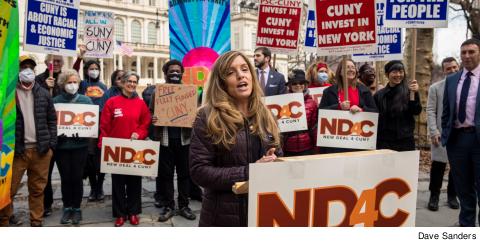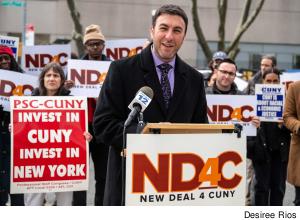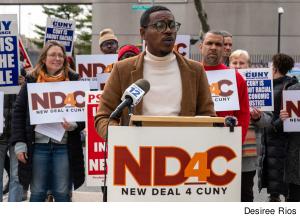Community college money at stake
 |
Mayor Eric Adams’s executive budget proposal calls for across-the-board 3% cuts to almost all city agencies. Because CUNY’s community colleges receive the lion’s share of their funding from the city, PSC is pressing its allies on the New York City Council to advocate to reverse these cuts and increase the city’s investment in CUNY.
City Council Speaker Adrienne Adams and Finance Committee Chair Justin Brannan announced a preliminary budget response with a commitment to a program dubbed the CUNY Reconnect Initiative, which, according to the council’s official budget statement, includes an additional “$23 million to fund a program that focuses on bringing the 700,000 working-age New Yorkers who left CUNY with some college credits but no degree…back into the system to earn a credential that helps them advance their careers.”
The City Council Committee on Higher Education Chair Eric Dinowitz said the inclusion of CUNY funding in the Council’s budget response “proves our commitment to moving our city in the right direction, especially with the funding of initiatives that enhance and improve the educational experience.”
SHIFTING FOCUS
With the finalization of the state budget, the PSC’s political focus has shifted toward the city budget. A final city budget must be reached by the end of June. Union activists are campaigning for the city to follow the state’s lead and invest more in CUNY.
Heather James, an assistant professor of political science at Borough of Manhattan Community College (BMCC) and a member of the PSC’s Legislative Committee, told Clarion that CUNY is included in the mayor’s across-the-board 3% cut for city agencies. During the pandemic, according to James, community colleges lost full-time faculty, and the proposed cuts, she said, would leave the system with fewer full-time professors than before the pandemic.
“We really highlighted the need to exempt us from the cuts. We have been functioning in an austerity budget and we are providing a city service when vulnerable communities are coming back from COVID,” James said. “We only have a couple of full-time political scientists to begin with [at BMCC]. We’re just going to hire contingent faculty instead. That’s definitely something that is concerning to us.”
Sharon Utakis, the PSC vice president of community colleges, said, “The city plays a very important role in funding CUNY’s community colleges, which have struggled throughout the pandemic. Community college enrollments have fallen sharply, which leaves our colleges millions of dollars short in tuition revenue because of our per-student funding model. We need the mayor’s budget to ensure baseline funding and to fulfill CUNY’s 2023 budget request for an additional $103 million in support for CUNY.
“CUNY community colleges need this in order to hire new full-time faculty (and convert adjunct lines to full-time), and to invest in mental health services, student academic support and childcare centers. Student academic support includes programs such as CLIP (the CUNY Language Immersion Program) and CUNY Start, for students who have English-language or developmental needs, and opportunity programs like College Discovery,” said Utakis.
‘ASAP FOR ALL’
 |
In testimony to the New York City Council Committee on Higher Education, PSC President James Davis suggested that the budget “move toward ‘ASAP for All,’ with an increased investment of $20 million,” noting that, “ASAP provides comprehensive student support and advising (ideally at a ratio of 150 students to one advisor), career services, tuition assistance, free MetroCards and free textbooks. It has been widely touted and serves as a model that community colleges seek to emulate across the country. ASAP’s three-year graduation rate is more than double that of non-ASAP associate degree students at CUNY’s community colleges and a CUNY analysis found that the program narrows existing graduation gaps for Black and Hispanic males. A move toward ‘ASAP for All’ would provide many more students with access to advising and the wraparound support they need to graduate. The city should baseline this increase in funding and dramatically expand this program.”
Davis added that the city’s funding for senior colleges should increase from $53 million to $60 million. “City funding for senior colleges has not increased since 2019. The money could fund programmatic expenses for important services, such as mental health counselors and academic advisors,” he said.
In a separate letter to Mayor Adams, Davis urged the city to “ensure a baseline of $1.2 billion and fulfill CUNY’s budget request of an additional $103 million in support of CUNY.”
At the Committee on Higher Education hearing, Dinowitz noted that he was “disappointed” in the city’s proposed budget cut to CUNY.
“I want [to] ensure that the city and CUNY are taking [their] rightful position to ease the current economic and social pains for [CUNY] students,” added Dinowitz.
Remysell Salas, an adjunct lecturer in ethnic and race studies at BMCC and campaign director of CUNY Rising Alliance, told the Council committee, “We should not even be thinking about cutting any kind of funding to community colleges.”
CHANCELLOR POSITION
CUNY Chancellor Félix V. Matos Rodríguez also told council members that he hoped the final budget would reverse cuts to CUNY.
“This reduction is especially challenging given the additional stress community colleges are facing and the unprecedented impact COVID has had on community college enrollment,” said Matos Rodríguez. “While CUNY is not unique in facing these challenges, and we are taking targeted steps to reverse this trend, decreased CUNY community college enrollment has led to a $113 million decrease in tuition revenue since fiscal year 2019.”
The CUNY chancellor added, “We request restoration of $2 million for remediation programs, $3 million for Citizenship Now! (which provides citizenship and immigration legal services in 39 city council districts throughout the five boroughs), $1 million for food insecurity programs and $600,000 for childcare. Restoring these funds will assist our students who have been greatly impacted by the pandemic.”
Generally, progressive city lawmakers voiced disappointment at the mayor’s proposed budget. The “cuts would roll back some sanitation services and cut funding for schools, among other things. Adams also eliminated 3,200 vacant positions for this year. The City Department of Correction were exempted from the cuts, ” Gothamist reported.
LAWMAKER DISSENT
 |
NYC Finance Committee Chair Brannan was quoted saying, “The dissonance of budget cuts amid the reality of a robust recovery is hard to wrap our heads around and difficult for this council to explain to our constituents…. Moreover, unintended austerity will jeopardize the progress of our recovery.”
For his part, Mayor Adams did briefly mention CUNY in his budget presentation in April.
“If we want to tackle high unemployment in communities of color, we must actively create opportunity. That means educating our youth for the jobs for the future and providing direct on-ramps to those jobs,” Adams said. “That’s why our executive budget includes $5 million in fiscal year 2023 to help the City University of New York train students for the most in-demand skills and connect them to good jobs at companies that are hiring. They will partner with some of the largest employers in our fastest-growing sectors – including life sciences, green jobs, tech and advanced manufacturing.”
The PSC saw the mayor’s comments as a starting point, but activists are pressing for full funding of CUNY in the city budget. Adequate funding would not only help students get the jobs they desire, but it would help them to discover a wide range of academic options leading to intellectual and creative growth. There is hope among PSC activists that Mayor Adams, a CUNY graduate, might understand both the City Council’s and the union’s position that CUNY needs more city funding, not less.

